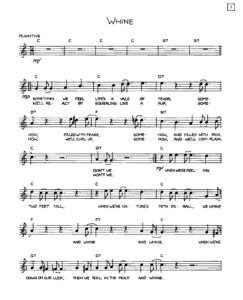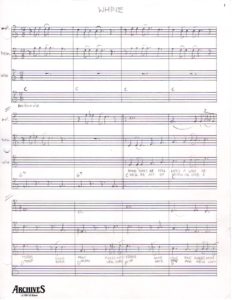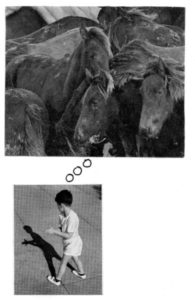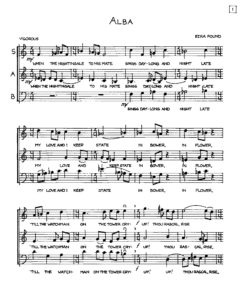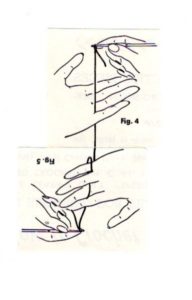This song appears on my album That Regrettable Weekend, available on Bandcamp. I also performed it once with the Dixon Place Ukulele Ensemble, way back when. Here’s the first page, plus the first page of the arrangement for voice, melodica, Tremoloa, and baritone uke.
Whine
September 25th, 2019 · 2 Comments
→ 2 CommentsTags: *Music · W
Rhymed Haiku
September 15th, 2019 · 2 Comments
I add yet another formal constraint to the roster. Rhymed haiku observe the strict 5-7-5 syllable count of traditional haiku, but add rhymes. Here are seven examples:
Look at all the salt
Sprinkled on my frosted malt
It’s the waiter’s fault
You thought it great sport
To commit a grievous tort
I’ll see you in court
What is this I found
Just lying here on the ground
It must weigh a pound
Consider the mole
It spends its life in a hole
That’s its only goal
In the afternoon
You will seldom see the moon
Because it’s too soon
This is just a hunch
That was not a wholesome crunch
In my bite of lunch
Everybody dies
Then we get our ears and eyes
Full of baby flies
→ 2 CommentsTags: *Words · R
Herrick Rerhymed
September 8th, 2019 · Comments Off on Herrick Rerhymed
All of Robert Herrick’s rhymes are replaced. This is what he’d be like if he were different.
HERRICK RERHYMED
Gather ye Rose-buds while ye might,
Old Time is still a tilting:
And this same flower that smiles so bright,
To morrow will be wilting.
The glorious Lamp of Heaven, his place
The higher he’s a wending;
The sooner will he run his Race,
And neerer be descending.
That Age is best, which is the prime,
When Youth and Blood are speeding;
But being spent, the poorer time
Will followe the preceding.
Then be not coy, but use your day,
Goe marry, reconnoiter;
For once your prime has pass’d away,
You may for ever loiter.
Comments Off on Herrick RerhymedTags: *Words · H
Index Cards (92)
September 1st, 2019 · Comments Off on Index Cards (92)
Comments Off on Index Cards (92)Tags: *Index Cards
The Isle of Dogs
August 27th, 2019 · 4 Comments
“The Isle of Dogs” is a story in my collection The Snowman Three Doors Down. In it, a group of scholars investigate the play of that name, by Ben Jonson and Thomas Nashe, which was suppressed and is now lost. The French play mentioned here, Caquire, is also real, but its use in the story is as a red herring. Red herrings are, after all, used to throw dogs off the scent; Nashe’s first work after The Isle of Dogs was Lenten Stuffe, which is, among other things, a book about red herrings.
Here’s how it begins.
THE ISLE OF DOGS
It was a late October afternoon, overcast and growing chillier by the minute. I decided to stop in at Red’s bookstore on my way home, to warm up and browse for a bit. And besides, I hadn’t seen Red in a while.
The bookstore was certainly warm, though even more cluttered than the last time I’d seen it, with even more stacks blocking the aisles. Red greeted me in his usual gruff but amicable way, and we exchanged a few uninspired observations on local politics. I never knew his real name; everyone called him Red because of his hair and politics, both of which, as his customers liked to joke, had grown thin and grizzled with age.
Once we had aired our usual scorn for our elected officials, and Red had groused about his latest aches and pains, I searched through the shelves, not neglecting the piles that grew, like paper stalagmites, from the floor. I thumbed through some Perec, some Addison, and Bullen’s edition of George Peele. My attention was eventually drawn to a small tattered volume, stuffed atop other books on a crowded shelf. It was old, and in poor condition, badly stained and missing more than a few pages. On opening it, I found a French play in verse, apparently devoted entirely to scatology. Most of the characters suffered from diarrhea, and the author specified that they wear costumes soiled with large stains. I was intrigued. Was it ever performed? Was it some precursor to Jarry? It was fairly expensive, though, especially given its condition, so I noted the title and author, and decided to look it up once I got home: Caquire, by Charles Decomble, published in Lyon by “Les Cyniques” in 1730. I did buy the Peele, and said goodnight to Red, earning his usual comically exaggerated grunt.
Once home, I searched the internet, and found a reference to Caquire in Pierre Gustave Brunet’s invaluable Anthologie scatologique, from 1862. Brunet quoted several lines from the beginning, as well as the stage direction (if you will excuse my translation), “He makes a great turd in his hand, which he sharpens into the form of a dagger,” and the remark at the end, “The table of contents is useless: there is only one thing in this work.” However, Brunet also noted that it was a parody of Voltaire’s tragedy Zaïre, and that it was credited to a M. Vessaire, obviously a pseudonym, and speculated that the real writer was either a certain Coste, or Comberousse.
→ 4 CommentsTags: *Words · I
Baron Aaron
August 19th, 2019 · 2 Comments
A rollicking fairy tale told with stringent poetic constraints! Here are the first six stanzas of thirty-three.
BARON AARON
The Baron Aaron, though of great nobility,
Did not appear particularly noble.
His face was red and round, his features mobile,
His body squat and scot-free of agility.
His intellect was frivolous and trivial;
He wasn’t ranked as one of nature’s smarties.
He spent his nights in masquerades and parties,
For he was unabashedly convivial.
He liked to party in the commissariat,
Where he made merry with the joyful gentry.
Beside the entryway, he kept a sentry
To pour out sherry for the proletariat.
The sentry was an adolescent layabout
Whose name was Darrin, and he had a sweetie.
He used his bayonet to write graffiti
About her charms, which he had lots to say about.
The object of his reveries was Beverly,
Who polished all the silverware and pewter.
She wasn’t very smitten with her suitor,
But then, he didn’t court her very cleverly.
He’d offer her a daisy or geranium,
Then scurry off with an embarrassed titter.
She’d drop the tattered token in the litter,
Persuaded he’d had trauma to the cranium.
→ 2 CommentsTags: *Words · B
The Pope’s Mustard-Maker
August 11th, 2019 · 2 Comments
The Pope’s Mustard-Maker is now available from Black Scat Books! Translated by Doug Skinner!
Le Moutardier du pape was the last work that Alfred Jarry finished, a few months before his death in 1907. It was one of many operettas he worked on in his last years, and one of the few he finished: a bawdy three-act farce loosely based on the medieval legend of Pope Joan, with a huge cast and lively songs bubbling with rhymes and wordplay.
Readers who know Jarry only from Ubu or his novels may be surprised that he wrote operettas, but his are fully Jarryesque, with his usual gusto for smutty jokes, legend, folklore, puns, wild invention, and popular theater. In his hands, Pope Joan becomes Jane, who runs off with her lover and disguises herself as pope. How will she pass inspection on the slotted chair? What will she do when her husband shows up? And has there ever been another production number celebrating the spiritual virtues of enemas?
This is the first translation of this major work! I also provide an introduction and notes, and scrupulously rendered all of Jarry’s rhyming verse into rhyming verse. Available from Amazon or Black Scat Books.
→ 2 CommentsTags: *Words · P
Alba
August 4th, 2019 · 1 Comment
I set this short poem by Ezra Pound when I was 19. The poem is one of Pound’s Provençal translations, from an anonymous troubadour; my setting favors fourths and fifths.
→ 1 CommentTags: *Music · A
Index Cards (91)
July 30th, 2019 · 1 Comment
→ 1 CommentTags: *Index Cards
Epiphanies
July 22nd, 2019 · 6 Comments
People seem to like epiphanies.
EPIPHANIES
I walked out to the back acre
Where the hawthorn climbed shyly over the sagging fence
Like a little girl at a birthday party
I looked off to the east
At the darkening clouds
And realized
Why my mother was never home on Sunday
I walked out into the anxious city
Where used Toyotas honked at sad-eyed drunks
Like a goat that needed milking
I looked up at the tall buildings
With their winking neon
And realized
Why my father always kept his desk locked
I walked out on the open farmland
Where the young green corn rustled in the wind
Like a truck with a stalled motor
I looked down at my threadbare jeans
And saw my fly was open
And realized
Why the farmer’s kids were laughing
I don’t know what to do with these epiphanies
Perhaps I’ll try to market them at Tiffany’s
→ 6 CommentsTags: *Words · E

